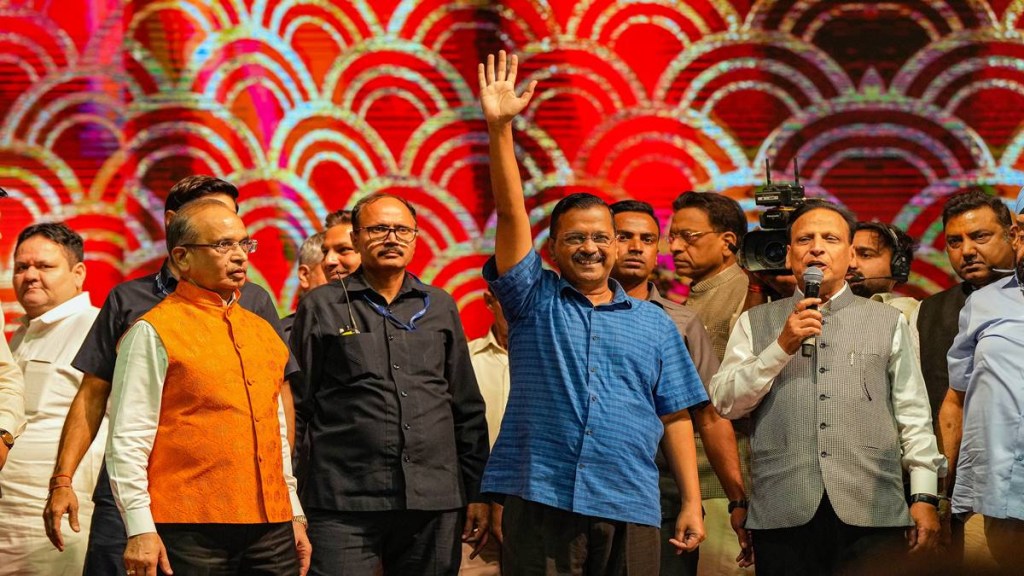Delhi Chief Minister Arvind Kejriwal skipped his appearance before the Enforcement Directorate on Thursday and is instead headed to poll-bound Madhya Pradesh for campaigning for the Aam Aadmi Party. Kejriwal was summoned by the central probe agency for questioning as part of its investigation into the now-scrapped Delhi excise policy 2021-22 case.
Ahead of his scheduled appearance, Kejriwal wrote to the ED, demanding that the agency “take back” its notice asking him to appear. The AAP’s national convener termed the summons “illegal and politically motivated” and sent at the behest of the Bharatiya Janata Party.
What next for ED and Kejriwal?
The ED, in all likelihood, is set to issue fresh summons to Kejriwal asking him to appear before it and give his statement to the agency. An individual summoned under the Prevention of Money Laundering Act — which is the case for Kejriwal — can skip an appearance thrice, following which the agency can move court seeking a non-bailable warrant against him/her.
The NBW is a court order asking the individual to appear before the agency at a specified date and time. A defiance of this court order can lead to Kejriwal’s arrest.
Also Read: ‘Politically motivated’: Arvind Kejriwal writes to ED, skips summons
At the moment, Kejriwal has limited options. He can either continue to ignore the summons issued by the ED and face the music or move court challenging the summons or seek anticipatory bail.
Why has ED summoned Arvind Kejriwal?
The summons to Arvind Kejriwal come as part of the Central Bureau of Investigation (CBI) and the Enforcement Directorate’s probe into the Delhi government’s now-scrapped excise policy for 2021-22 that allegedly favoured certain liquor dealers. The AAP has denied the charge.
The ED case stems from a report of the chief secretary of the Delhi government, which cited various alleged irregularities including a waiver of Rs 144 crore to the retail licensees under the policy in the name of COVID-19-impacted sales and a refund of Rs 30 crore to a successful bidder for the airport zone who failed to obtain a no objection certificate for opening liquor stores there, officials said.
Also Read: Supreme Court rejects Manish Sisodia’s bail plea in Delhi excise policy case
According to officials, another allegation was that the commission of wholesale licensees was raised from five per cent to 12 per cent in an instance of “quid pro quo”.
The summons to Kejriwal came six months following his marathon questioning by the CBI in the liquor policy case. Kejriwal’s former cabinet colleague Manish Sisodia has been in jail in the same case since his arrest on February 26 this year. His bail plea was rejected by the Supreme Court last month. Another AAP minister Sanjay Singh was also arrested in October in the same case.
What is the Delhi liquor policy case?
The arrests come over allegations of corruption in the formulation and implementation of the Delhi Excise Policy 2021-22, which came into force in November 2021 but was scrapped in July 2022. The report by the Delhi chief secretary to Lieutenant Governor VK Saxena said that “arbitrary and unilateral decisions” taken by Sisodia in his capacity as Excise Minister had resulted in “financial losses to the exchequer” estimated at more than Rs 580 crore.
Also Read: AAP MP Sanjay Singh remanded to ED custody till October
It also alleged that “kickbacks…received by the AAP Delhi government and AAP leaders” from owners and operators of alcohol businesses for preferential treatment such as discounts and extensions in licence fee, waiver on penalties and relief due to disruptions caused by the Covid-19 pandemic, etc. were used to “influence” the Assembly elections held in Punjab and Goa in early 2022.
As per the ED, the “scam” was to give the wholesale liquor business to private entities and fix a 12 per cent margin, for a 6 per cent kickback. In its first prosecution complaint in November 2021, the ED said the policy was “formulated with deliberate loopholes” that “promoted cartel formations through the back door” to benefit AAP leaders.
(With agencies)

